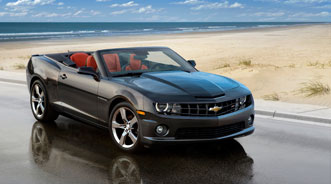Chevy Celebrates Landmark, 100M Small Block Engine to Be Built This Year

By subscribing, you agree to receive communications from Auto Remarketing and our partners in accordance with our Privacy Policy. We may share your information with select partners and sponsors who may contact you about their products and services. You may unsubscribe at any time.
DETROIT –
As Chevrolet prepares for its 100th birthday — Nov. 3 — the automaker recently revealed it will reach yet another landmark this year. The 100-millionth Chevy Small Block engine — a compact V-8 engine — will be produced this year.
Introduced to the industry in 1955, Jim Campbell, vice president of General Motors performance vehicles and motorsports, asserts “the introduction of the Small Block changed everything.”
Highlighting some history behind the V-8 engine, Chevy noted that from 1929 to 1955, the automaker only offered six-cylinder engines.
In hopes of keeping up with the performance market, chief engineer at the time Ed Cole designed a 90-degree V-8 engine, featuring overhead valves, a pushrod valvetrain and 4.4-inch on-center bore spacing, known as the Chevy Small Block.
Company officials note that its Big Block follows the same formula, with the exception of a wider 4.8 inch bore spacing.
When the first Small Block came out it 1955, it delivered 195 horsepower with an optional four-barrel carburetor. Only two years after it was introduced, the addition of fuel injection increased output to 283 horsepower – or one horsepower for every cubic inch of the 283 cid engine. By 1970, the Chevy V-8 family grew to include a 450 horsepower, 454-cid Big Block, the company stressed.
Subscribe to Auto Remarketing to stay informed and stay ahead.
By subscribing, you agree to receive communications from Auto Remarketing and our partners in accordance with our Privacy Policy. We may share your information with select partners and sponsors who may contact you about their products and services. You may unsubscribe at any time.
“The performance of the Small Block transformed Chevrolet,” said Campbell. “The Small Block made Chevrolet the weapon of choice for grassroots racers on the drag-racing and sports-car tracks across America.
“It also powered Chevrolet’s factory racing programs, leading to wins in stock car, endurance, and Trans Am series. Chevrolet’s racing experience in turn led to more potent production cars, creating legendary names like Corvette, Camaro, Impala and Chevelle,” he added.
That said, Chevy noted it now sells more four-cylinders than V-8s, but “descendents of the original Chevy Small Block still power Chevrolet’s most-capable production and racing vehicles.”
Like the original, the automaker’s current V-8s are small and light, “making it efficient at turning fuel into horsepower.”
“Without question, the current Chevrolet V-8s are lineal descendants of the 1955 small block,” said Sam Winegarden, GM executive director for global engine engineering.
“They retain the 90-degree V-configured eight-cylinder layout, overhead valve placement and characteristic pushrod valve train. Where they differ are the modern technologies that would have sounded like science fiction 50 years ago, such as all-aluminum blocks, titanium connecting rods, Active Fuel Management and variable valve timing,” he further explained.
Chevy also mentioned that its V-8 has become one of “the most popular crate engines in the industry” due to its compact dimensions, among other attributes.
Some of the engine’s fans also voiced their opinions on the V-8.
Tammy Ray, winner of the 2010 Ridler Award, one of the top awards for Hot-Rod enthusiasts, said, “My builder will say you can get more horsepower out of a Chevy than a Ford.
“For me, the decision was based solely on appearance. The Chevy V-8 is much cleaner, more compact, and with so many parts available, I could customize every part of the engine — right down to the gold nuggets inlaid on valve covers,” she added.
Moreover, hot rod fans today have quite a few options when selecting a Chevy V-8 crate engine.
The company gave a few examples, noting, “The classic 350 cid Small Block, with 290 horsepower, delivers affordable power and easy modification, making it ideal starting point for many project cars.
“The earth-shaking, 572-cid ZZ572R Big Block delivers 720 horsepower and 685 pound-feet of torque make it ideal for drag racing,” it added.
Campbell offered his opinion, saying, “More people do more things with a Small Block than any other engine, and probably more than all other engine platforms combined.
“There’s a Small Block to fit almost any hot rodder’s needs, whether they are building a gold-plated hot rod, a 1,000-horsepower dragster or an emissions-compliant project car,” he continued.
Lastly, Chevy went on to note that the Small Block has made the automaker one of the most-winning names in NASCAR history, and it powered the Corvette Racing team to seven class wins at Le Mans between 2001 and 2011.
For street driving, the Small Block powers Chevy’s full-size trucks, such as Silverado and Suburban, as well as performance cars including the Camaro and Corvette.
“Constant innovation and evolution have made the Small Block relevant for more than 50 years,” said Winegarden.
“We are actively working on the fifth generation of the Small Block, which we believe will be the best V-8 engines ever made. By adding new technologies, such as direct injection, we will continue to improve the performance, durability and efficiency of the iconic Chevy V-8,” he concluded.


